The Jealousy Man and Other Stories Read online
ALSO BY JO NESBØ
Headhunters
The Son
Blood on Snow
Midnight Sun
Macbeth
The Kingdom
BOOKS IN THE HARRY HOLE SERIES
The Bat
Cockroaches
The Redbreast
Nemesis
The Devil’s Star
The Redeemer
The Snowman
The Leopard
Phantom
Police
The Thirst
Knife
THIS IS A BORZOI BOOK PUBLISHED BY ALFRED A. KNOPF
English translation copyright © 2021 by Robert Ferguson
All rights reserved. Published in the United States by Alfred A. Knopf, a division of Penguin Random House LLC, New York. Originally published in Norway as Sjalusimannen og andre fortellinger by H. Aschehoug & Co, Oslo, in 2021. Copyright © 2021 by Jo Nesbø. This translation was originally published in hardcover by Harvill Secker, an imprint of Vintage, a division of Penguin Random House Ltd., London, in 2021. Published by agreement with the Salomonsson Agency.
www.aaknopf.com
Knopf, Borzoi Books, and the colophon are registered trademarks of Penguin Random House LLC.
Library of Congress Control Number: 2021941910
ISBN 9780593321003 (hardcover) 9780593321010 (ebook)
Ebook ISBN 9780593321010
This is a work of fiction. Names, characters, places, and incidents either are the product of the author’s imagination or are used fictitiously. Any resemblance to actual persons, living or dead, events, or locales is entirely coincidental.
Cover images: (swimmer) Ivan Nanita / EyeEm / Getty Images; (clouds) john finney photography / Moment / Getty Images
Cover design by Michael J. Windsor
a_prh_5.8.0_c0_r0
CONTENTS
Part One: Jealousy
London
The Jealousy Man
The Line
Trash
The Confession
Odd
The Earring
Part Two: Power
Rat Island
The Shredder
The Cicadas
The Antidote
Black Knight
PART ONE
Jealousy
LONDON
i’m not afraid of flying. The chances of dying in a plane crash for the average frequent flyer are one in eleven million. To put it another way: your chances of dying of a heart attack in your seat are eight times higher.
I waited until the plane took off and levelled out before leaning to one side and in a low and hopefully reassuring voice passed this statistic on to the sobbing, shaking woman in the window seat.
‘But of course, statistics don’t mean much when you’re afraid,’ I added. ‘I say this because I know exactly how you feel.’
You – who until now had been staring fixedly out of the window – turned slowly and looked at me – as though you had only now discovered someone was sitting in the seat next to yours. The thing about business class is that the extra centimetres between the seats mean that with a slight effort of concentration it’s possible to persuade yourself that you are alone. And there is a common understanding between business-class passengers that one should not break this illusion by exchanging anything beyond brief courtesies and any practical matters that have to be dealt with (‘Is it OK if I pull down the blind?’). And since the extra space in the footwells makes it possible to pass each other if needing to use the toilet, the overhead lockers and so on without requiring a coordinated operation, it is, in practice, quite possible to ignore one another completely, even on a flight that lasts half a day.
From the expression on your face I gathered that you were mildly surprised at my having broken the first rule of travelling business class. Something about the effortless elegance of your outfit – trousers and a pullover in colours which I wasn’t completely convinced were matching but which do so nevertheless, I guess because of the person who is wearing them – told me that it was quite a while since you had travelled economy class, if indeed you had ever done so. And yet you had been crying, so wasn’t it actually you who had broken through that implied wall? On the other hand, you had done your crying turned away from me, clearly showing that this wasn’t something you wanted to share with your fellow passengers.
Well, not to have offered a few words of comfort would have been bordering on the cold, so I could only hope that you would understand the dilemma facing me.
Your face was pale and tear-stained, but still remarkable, with a kind of elvish beauty. Or was it actually the pallor and the tear stains that made you so beautiful? I have always had a weakness for the vulnerable and sensitive. I offered you the serviette the stewardess had placed under our tumblers of water before take-off.
‘Thank you,’ you said, taking the serviette. You managed a smile and pressed the serviette against the mascara running down under one eye. ‘But I don’t believe it.’ Then you turned back to the window, pressed your forehead against the Plexiglas as though to hide yourself, and again the sobs shook your body. You don’t believe what? That I know how you’re feeling? Whatever, I had done my bit and from here on, of course, made up my mind to leave you in peace. I intended to watch half a film and then try to sleep, even though I reckoned I would get an hour at most, I rarely manage to sleep, no matter how long the flight, and especially when I know I need to sleep. I would be spending only six hours in London, and then it was back to New York.
The Fasten your seat belt light went off and a stewardess came up, refreshed the empty glasses that stood on the broad, solid armrest between us. Before take-off the captain had informed us that tonight’s flight from New York to London would take five hours and ten minutes. Some of those around us had already lowered their seatbacks and wrapped blankets around themselves, others sat with faces lit by the video screens in front of them and waited for their meal. Both I and the woman next to me had said no thanks when the stewardess came round with the menu before take-off. I had been pleased to find a film in the Classics section – Strangers on a Train – and was about to put my headphones on when I heard your voice:
‘It’s my husband.’
Still holding the headphones in my hands I turned to her.
The mascara had stopped running and now outlined your eyes like stage make-up. ‘He’s cheating on me with my best friend.’
I don’t know whether you realised yourself that it was strange to be still referring to this person as your best friend, but I couldn’t see that it was any of my business to point it out to you.
‘I’m sorry,’ I said instead. ‘I didn’t intend to pry…’
‘Don’t apologise, it’s nice when someone cares. Far too few do. We’re so terrified of anything upsetting and sad.’
‘You’re right there,’ I said, unsure whether to put the headphones aside or not.
‘I expect they’re in bed with each other right now,’ you said. ‘Robert’s always horny. And Melissa too. They’re fucking each other between my silk sheets right at this very moment.’
My brain at once conjured up a picture of a married couple in their thirties. He earned the money, a lot of money, and you got to choose the bedlinen. Our brains are expert at formulating stereotypes. Now and then they’re wrong. Now and then they’re right.
‘That must be terrible,’ I said, trying not to sound too dramatic.
‘I just want to die,’ you said. ‘So you’re mistaken
about the plane. I hope it does crash.’
‘But I’ve got so much still left to do,’ I said, putting a worried look on my face.
For a moment you just stared at me. Maybe it was a bad joke, or at the very least bad timing, and under the circumstances maybe too flippant. After all, you had just said you wanted to die, and had even given me a credible reason for saying it. The joke could be taken either as inappropriate and insensitive or as a liberating distraction from the undeniable bleakness of the moment. Comic relief, as people call it. At least when it works. Whatever, I regretted the remark, and was actually holding my breath. And then you smiled. Just a tiny wavelet on a slushy puddle, gone in the same instant; but I breathed out again.
‘Relax,’ you said quietly. ‘I’m the only one who’s going to die.’
I looked quizzically at you, but you avoided my eyes, instead looked past me and into the cabin.
‘There’s a baby over there on the second row,’ you said. ‘A baby in business class that might be crying all night; what d’you think of that?’
‘What is there to think?’
‘You could say that the parents should understand that people who have paid extra to sit here do so because they need the sleep. Maybe they’re going straight to work, or they have a meeting first thing in the morning.’
‘Well, maybe. But as long as the airline doesn’t ban babies in business class then you can’t really expect parents not to take advantage.’
‘Then the airline should be punished for tricking us.’ You dabbed carefully under the other eye, having exchanged the serviette I had handed you for a Kleenex of your own. ‘The business-class adverts show pictures of the passengers blissfully sleeping.’
‘In the long run the company’ll get its just deserts. We don’t like paying for something we don’t get.’
‘But why do they do it?’
‘The parents or the airline?’
‘I understand the parents do it because they’ve got more money than they have shame. But surely the airline has to be losing money if their business-class offer is being degraded?’
‘But it’ll also damage their reputation if they get publicly shamed for not being child-friendly.’
‘The child doesn’t give a damn if it’s crying in business or economy class.’
‘You’re right, I meant for not being parent-of-small-child-friendly.’ I smiled. ‘The airlines are probably worried it’ll look like a kind of apartheid. Of course, the problem could be solved if anyone crying in the business section was made to sit in the economy section and had to give up their seat to a smiling, easy-going person with a cheap ticket.’
Your laughter was soft and attractive, and this time it got as far as your eyes. It’s easy to think – and I did think – that it’s incomprehensible how anyone could be unfaithful to a woman as beautiful as you, but that’s how it is: it isn’t about external beauty. Nor inner beauty either.
‘What line of work are you in?’ you asked.
‘I’m a psychologist and researcher.’
‘And what are you researching?’
‘People.’
‘Of course. And what are your findings?’
‘That Freud was right.’
‘About what?’
‘That people, with just a few exceptions, are pretty much worthless.’
You laughed. ‘Amen to that, Mr…’
‘Call me Shaun.’
‘Maria. But you don’t really believe that, Shaun, do you?’
‘That with a few exceptions people are worthless? Why shouldn’t I believe that?’
‘You’ve shown that you’re compassionate, and to a genuine misanthropist compassion means nothing.’
‘I see. So why should I lie about it?’
‘For the same reason, because you’re a compassionate person. You play up to me discreetly by claiming to be afraid of flying, same as me. When I tell you I’m being betrayed you comfort me by telling me how the world is full of bad people.’
‘Wow. And I thought I was supposed to be the psychologist here.’
‘See, even your choice of career betrays you. You might as well just admit it, you’re the best proof against your own proposition. You’re a worthwhile person.’
‘I wish that were the case, Maria, but I’m afraid my apparent compassion is merely the result of a bourgeois English upbringing, and that I’m not worth much to anyone other than myself.’
You turned your body a couple of almost imperceptible degrees closer to me. ‘Then it’s your upbringing that gives you worth, Shaun. So what? It’s what you do, not what you think and feel, that gives you value.’
‘I think you’re exaggerating. My upbringing means only that I don’t like to break the rules for what is considered acceptable behaviour, I don’t make any genuine sacrifices. I adapt, and I avoid unpleasantness.’
‘Well, at least as a psychologist you have value.’
‘I’m a disappointment there too, I’m afraid. I’m not intelligent or industrious enough ever to discover a cure for schizophrenia. If the plane went down now all the world would lose would be a rather boring article on confirmation bias in a scientific periodical read by a handful of psychologists, that’s all.’
‘Are you being coy?’
‘Yes, I’m coy too. That’s another of my vices.’
By now you were laughing brightly. ‘Not even your wife and children would miss you if you disappeared?’
‘No,’ I answered abruptly. Since I had the aisle seat I couldn’t just end the conversation by turning to the window and pretending to have spotted something interesting in the dead of the night down there in the Atlantic. To pull the magazine out of the seat pocket in front of me would seem too obvious.
‘Sorry,’ you said quietly.
‘It’s OK,’ I said. ‘What did you mean when you said you were going to die?’
Our eyes met and for the first time we saw each other. And though this might be with the benefit of hindsight, I think we both caught a glimpse of something that told us, even then, that this was a meeting that just might change everything. Indeed, that had already changed everything. Perhaps you were thinking that too but then were distracted as you leaned over the armrest towards me and noticed how I stiffened.
The scent of your perfume had made me think of her. That it was her smell, that she had come back. So you leaned back in your seat and looked at me.
‘I’m going to kill myself,’ you whispered.
Then you leaned back in your seat and studied me.
I don’t know what my face expressed, but I knew you weren’t lying.
‘How do you propose to do it?’ was all I could think to say.
‘Shall I tell you?’ you asked with an impenetrable, almost amused smile.
I thought about it. Did I want to know?
‘Anyway it’s not really true,’ you said. ‘In the first place, I’m not going to kill myself, I’ve already done it. And in the second place, it’s not me who’s killing myself, it’s them.’
‘Them?’
‘Yes. I signed the agreement about…’ You looked at your watch, a Cartier. I guessed it was a present from this Robert. Before or after he was unfaithful? After. This Melissa wasn’t the first, he’d been unfaithful from the beginning. ‘…four hours ago.’
‘Them?’ I repeated.
‘The suicide agency.’
‘You mean…like in Switzerland? As in, assisted suicide?’
‘Yes, only with more assistance. The difference is that they kill you in such a way that it doesn’t look like suicide.’
‘Really?’
‘You look as if you don’t believe me.’
‘I…oh yes, yes I do. I’m just very surprised.’
‘I can understand that. And this has to be just between us, because there’s
a confidentiality clause in the contract, so I’m not actually supposed to talk to anyone about it. It’s just…’ You smiled, at the same time as the tears welled up in your eyes again. ‘…so intolerably lonely. And you are a stranger. And a psychologist. You’re pledged to confidentiality, right?’
I coughed. ‘In regard to patients, yes.’
‘Well then, I’m your patient. I can see you have a vacant appointment right now. What is your fee, doctor?’
‘I’m afraid we can’t do it like that, Maria.’
‘Of course not, that would be against the rules of the profession. But surely you can just listen as a private individual?’
‘You must understand that it presents ethical problems for me as a psychologist if someone with suicidal tendencies confides in me without my doing anything about it.’
‘You don’t understand. It’s too late to do anything about it, I am already dead.’
‘You’re dead?’
‘The contract is non-reversible, I will be killed within three weeks. They explain to you in advance, that once you’ve signed your name to the contract, there is no panic button, that if they allowed that it might create all kinds of legal complications afterwards. You’re sitting next to a corpse, Shaun.’ She laughed, but now her laughter was hard and bitter. ‘Surely you can have a drink with me and listen for a while?’ You raised a long, slender arm to the service button and its sonar ping rang through the darkness of the cabin.
‘Fair enough,’ I said. ‘But I am not going to give you any advice.’
‘Fine. And you promise not to talk about it later, even after I’m dead?’
‘I promise,’ I said. ‘Although I can’t see what difference it would make to you.’
‘Oh it would. If I break the confidentiality clause in the contract they can sue my estate for a fortune, and that would leave almost nothing for the organisation I’m leaving the money to.’
‘How can I help?’ asked the stewardess who had soundlessly materialised beside us. You leaned across me and ordered gin and tonics for both of us. The neck of your pullover fell forward slightly, and I saw the naked, pale skin and realised that you did not have her smell. Your smell was faintly sweet, aromatic, like petrol. Yes, petrol. And a kind of tree the name of which I could not recall. It was an almost masculine smell.

 Blood on Snow: A novel
Blood on Snow: A novel Police: A Harry Hole thriller (Oslo Sequence 8)
Police: A Harry Hole thriller (Oslo Sequence 8) Doctor Proctor's Fart Powder: The Great Gold Robbery
Doctor Proctor's Fart Powder: The Great Gold Robbery Bubble in the Bathtub
Bubble in the Bathtub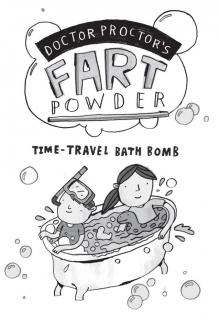 Doctor Proctor's Fart Powder: Time-Travel Bath Bomb
Doctor Proctor's Fart Powder: Time-Travel Bath Bomb The Bat
The Bat Doctor Proctor's Fart Powder: The End of the World. Maybe.
Doctor Proctor's Fart Powder: The End of the World. Maybe. Silent (but Deadly) Night
Silent (but Deadly) Night Who Cut the Cheese?
Who Cut the Cheese? Headhunters
Headhunters The Jealousy Man and Other Stories
The Jealousy Man and Other Stories Harry Hole Mysteries 3-Book Bundle
Harry Hole Mysteries 3-Book Bundle The Thirst
The Thirst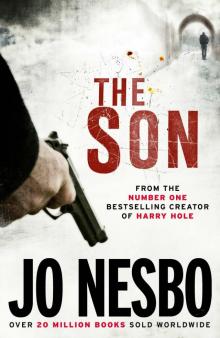 The Son
The Son The Redeemer
The Redeemer The Kingdom
The Kingdom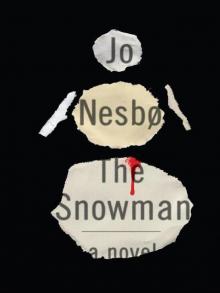 The Snowman
The Snowman The Redbreast
The Redbreast Phantom
Phantom Macbeth
Macbeth The Leopard
The Leopard Blood on Snow
Blood on Snow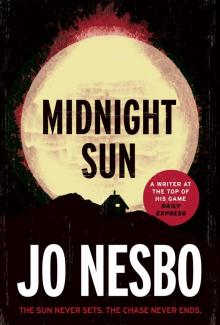 Midnight Sun
Midnight Sun The Redbreast (Harry Hole)
The Redbreast (Harry Hole) The Devil's Star
The Devil's Star Cockroaches
Cockroaches The Magical Fruit
The Magical Fruit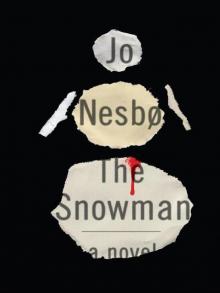 The Snowman: A Harry Hole Novel
The Snowman: A Harry Hole Novel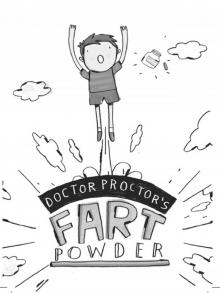 Doctor Proctor's Fart Powder
Doctor Proctor's Fart Powder The Cockroaches
The Cockroaches Knife
Knife Phantom hh-9
Phantom hh-9 The Redbreast hh-3
The Redbreast hh-3 The Redeemer hh-6
The Redeemer hh-6 The Leopard hh-8
The Leopard hh-8 The Leopard: An Inspector Harry Hole Novel
The Leopard: An Inspector Harry Hole Novel The Great Gold Robbery
The Great Gold Robbery Police hh-10
Police hh-10 The End of the World. Maybe
The End of the World. Maybe The Thirst: Harry Hole 11
The Thirst: Harry Hole 11 Nemesis - Harry Hole 02
Nemesis - Harry Hole 02 The Devil's star hh-5
The Devil's star hh-5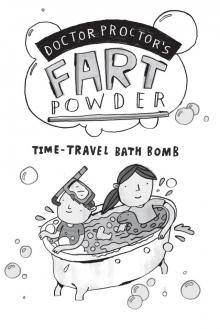 Time-Travel Bath Bomb
Time-Travel Bath Bomb